|
THE PROVIDENCE SUNDAY JOURNAL,
March 30, 1952
Hunts Rare Toy Banks
As a Hobby
By DOROTHY AGNEW
AN IMPRESSIVE group of the now-scarce, cast-iron
mechanical banks of the late1800's is owned and
highly prized by Wesley W. Yando of 82 Glenwood
Avenue, Pawtucket.
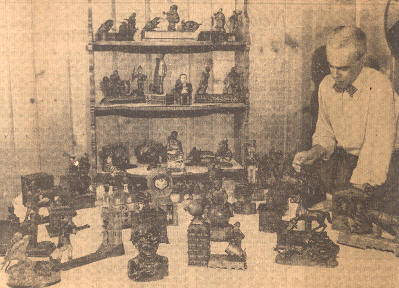
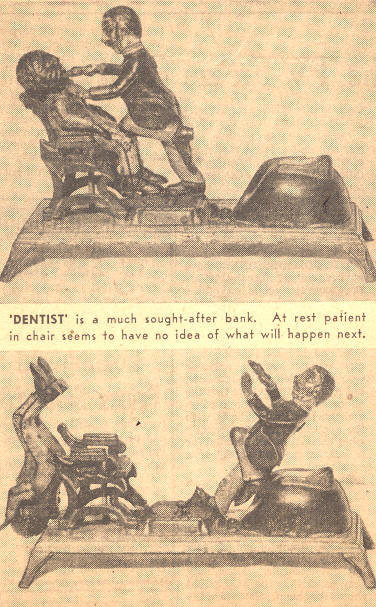
In three years Mr. Yando has acquired 50
of the banks. Each is in excellent working order and each has its original
paint. The number hit the half-hundred mark this month.
Without the slightest intention of starting a collection Mr. Yando bought
his first bank at an auction in Southboro, Mass.
It was to be a gift to his very young granddaughter. He thought she would
be amused at the little dog hopping through a
hoop when fed a penny.
But
Grandfather did not reckon on the appeal the bank was to have for himself.
Delighted at its performance, he fed it penny after penny, then took it
apart to see what made it tick. Very careful not to mar the finish,
already bearing old scars, he reassembled the parts and placed it on a
shelf.
Soon
another bank was bought to join the first.
Although mechanical banks are not easy to track
down nowadays, seven were picked up the first year. Last year
netted 27 but by then a real hunt was on.
And Mr. Yando began to swap his duplicate banks for
models he didn't have.
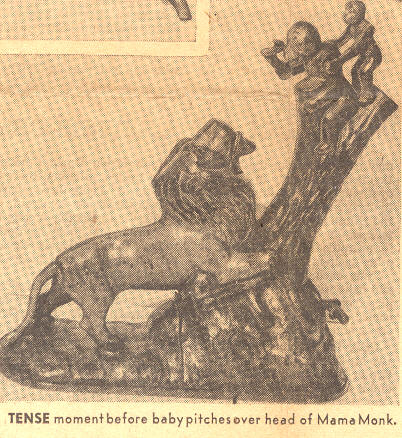
Growing Scarce
Although they were fairly common at one time
mechanical banks in perfect condition have become scarce for several
reasons. Rough usage by children made junk of many of them. Almost
every bank has one vulnerable Part, such as a
raised hand, which is almost certain to be
damaged by a fall or sharp blow. Repaired or repainted banks are scorned
by serious collectors.
A
great many banks have been broken in the mail because one collector
shipping a choice piece to another has failed to
pad it properly for the trip.
Some
probably are still packed away in attics and forgotten. A trip to
Connecticut in the hope of buying an antique maple bed rewarded Mr. Yando
with a bank that was not on his list. Guided into a dusty shed to examine
furniture, his eye lighted On a long-neglected
"Frog, Old Man and Goat" in a corner.
When
soot was wiped away and the mechanism tested, another good bank was
brought out into the open.
Most Have Names
Most banks have titles and well-informed
collectors always refer to then by
name. Sometimes the name is quite
descriptive of the appearance or action. Others have
names that make one wonder why they are so called.
Acknowledged by many experts to be the first of
the American-made mechanical banks is "Hall's
Excelsior." It is a miniature bank building. A
penny placed on a shelf is apparently pulled in
as a monkey suddenly puts in an appearance on
the roof.
Another known as "Creed-moor"
took its name from an old New York State Rifle Range, according to
Mr. Yando's record book. It is of the artillery
type-- the firing" of a rifle is timed with the
disappearance of the coin.
The
title "Calamity" gives no hint of what the bank
might be like although a second name "Football" sometimes
used is more informative. Even then one wonders
what is so calamitous. However, the fast action of three players changing
positions is so fascinating that plenty of coins are dropped in the slot
by bystanders eager to see a repeat performance.
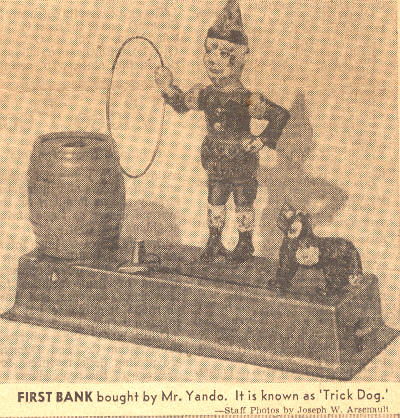
Keeps Pennies Handy
For interested observers — and everyone who sees
one of these banks has an irresistible urge to
test it — Mr. Yando keeps a box of pennies
nearby. But the treasury grows regardless. Men
usually dig down in their pockets and pick out pennies from their small
change. Women reach for their purses.
Children however are not so conscientious in
paying for the amusement. When allowed they dip freely in the penny box.
Their tastes in mechanical banks are apt to run along different lines from
those of adults. Grownups seem to prefer banks with the most
complicated action. A child generally
concentrates on a single figure or a clear-cut
grouping after trying out the others.
Strange as it may seem, the favorite of the little girl for
whom the first bank was bought is "Tammany" which depicts a greedy
pot-bellied politician. Not sensing the implications in this figure, which
swallows up every penny that comes near it, she
calls it the "Thank You Bank" because the head nods each
time the figure takes a
coin.
Regarding the banks as just so
many toys, she is too young yet to realize they
make up a collection which grows more valuable at time goes on. Neither
does she sense it is being built up as part of her inheritance.
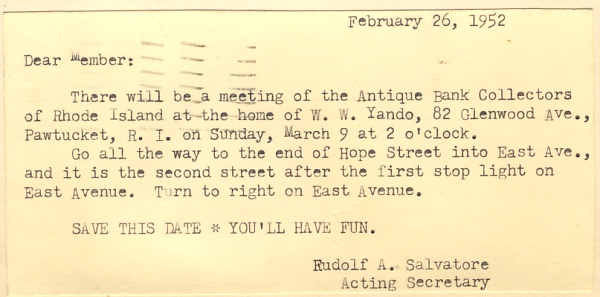
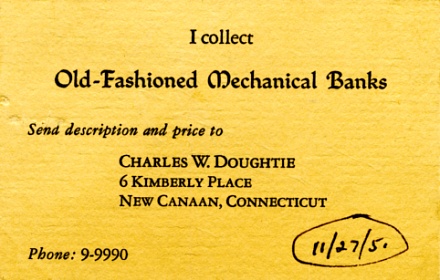
|






